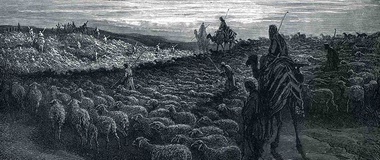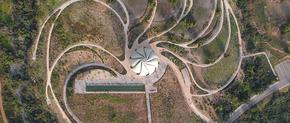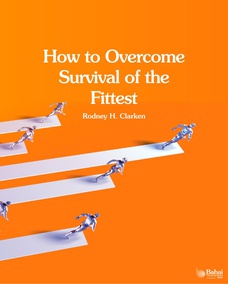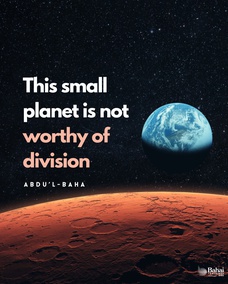The views expressed in our content reflect individual perspectives and do not represent the authoritative views of the Baha'i Faith.
Abraham, the Friend of God, appeared and shed upon the world the light of Divine Revelation. – Baha’u’llah, Gleanings from the Writings of Baha’u’llah, p. 173.
Four thousand years ago, Abraham was alive and on the move, though not voluntarily.
The Old Testament prophet–banished from Iraq for preaching monotheistic ideas that angered the local polytheistic priesthood–headed toward Israel, where he would make a new life and establish a group of followers who would remember him and try to follow his teachings. Or, to describe it in biblical terms, Abraham was traveling away from Ur of the Chaldees, intent on reaching the Land of Canaan. Seeking to share a new religious message, Abraham followed in the noble footsteps of several of his prophetic ancestors, including Enoch and Noah, who had also been active in the Middle East.

Abraham, Sara and an Angel
During his life, Abraham would face rejection, danger, and banishment; but, precisely because he was willing to sacrifice His own comfort and follow God, He would also receive divine blessings. His impact on the world would become enormous. Over the course of four thousand years, His descendants, born of three different women, would give rise to several religions and cause Abraham’s name to be revered throughout the world.
Creating an exact timeframe for the events of Abraham’s life would be a wonderful thing, but his date of birth remains elusive. For our purposes, a date of roughly 2000 BC will suffice, though there are legitimate arguments for setting it as early as 2158 BC or as late as the year that is honored by Jewish tradition: 1812 BC. Whatever Abraham’s date of birth, the scene of his nativity is generally agreed to be somewhere in southern Iraq, along the course of the Euphrates River. Due to historical changes in terminology, this area has been described in several different ways. Islamic traditions refer to the setting as Babylon. The Baha’i writings say Abraham was born in Mesopotamia, a large area that includes southern Iraq and a smidgen of Iran, along with slices of Turkey and Syria.
The Old Testament description joins the name of what was once a well-known city (Ur) to the name of a powerful tribe (the Chaldeans), producing the name in the Book of Genesis: Ur of the Chaldees or, in some translations, Ur of the Chaldeans.
The city of Ur itself, which lay within the heart of the region referred to as Ur of the Chaldees, is the site most often suggested as the place Abraham’s birthplace. Situated at the edge of the Euphrates River, about two hundred miles south of Baghdad today, it was one of the most cosmopolitan metropolises of the world. Within its protective walls lived as many as sixty-five thousand people, some of them wealthy enough to wear lapis lazuli necklaces of the deepest blue, drink from silver cups, eat from alabaster bowls, and hire servants to do their household work.
But, tempting as the city of Ur might be, several arguments exist against believing that it was the site of Abraham’s birth. The first argument doesn’t negate Ur as a choice but simply points out that the term Ur of the Chaldees refers to the whole region, which included dozens of towns and villages where Abraham’s parents might have lived. Another argument against the city of Ur emerges from a verse in the Book of Joshua that indicates that God brought Abraham to Israel from “the other side of the flood.”
Interpreting “flood” as “Euphrates” because the river was famous for its seasonal floods, and looking at geography from Israel’s perspective (which is where Joshua was living), Joshua’s finger seems to point not to the city of Ur, located on the west side of the river, but to the land on the “far” or eastern side of the river. On the other hand, the verse may be a purely metaphorical description of the way in which Abraham’s Revelation succeeded Noah’s, because Noah was before the flood and Abraham was after it, or “on the other side.”
Yet another strike against the metropolis of Ur lies in Jewish tradition, which names the place of Abraham’s birth quite specifically as the town of Kutha (also spelled Cuthah). Located about forty miles south of modern Baghdad, Kutha is positioned “on the other side of the flood” because it is on the east bank of the Euphrates.
And, as a clincher, one of the tells within its boundaries has Abraham’s name attached to it. Tell, meaning tall or hill, is a word that has been used for centuries to refer to mounds of rubble from ancient settlements that were destroyed or abandoned because of the catastrophic effects of earthquakes, floods, and war—not to mention plagues, shifting riverbeds, and wells that ran dry. To differentiate one tell from another, local residents have habitually added a descriptor referring to a memorable event, a famous resident, or the original name of the collapsed village. Tell Basta in Egypt, for instance, was once the home of the cult of the cat-goddess Bastet. And Tell Ibrahim at Kutha (Ibrahim is the Arabic transliteration of Abraham) got its name because of its historical connection to the life of Abraham—or at least that’s the theory.
Perhaps somewhere in an as-yet-unexcavated ruin lies a clue whose retrieval will dispel the mysteries surrounding Abraham’s birth and settle the issue. Meanwhile, we are forced to be content with knowing that in a city, town, village or encampment somewhere along the Euphrates—we’ll call it Ur while agreeing that it might not be—a very important baby was born, whose life and teachings would affect most of humanity for thousands of years and form the basis for much of humanity’s religious belief in this modern age.
Get your copy now: Abraham: One God, Three Wives, Five Religions
















Comments
Sign in or create an account
Continue with Googleor